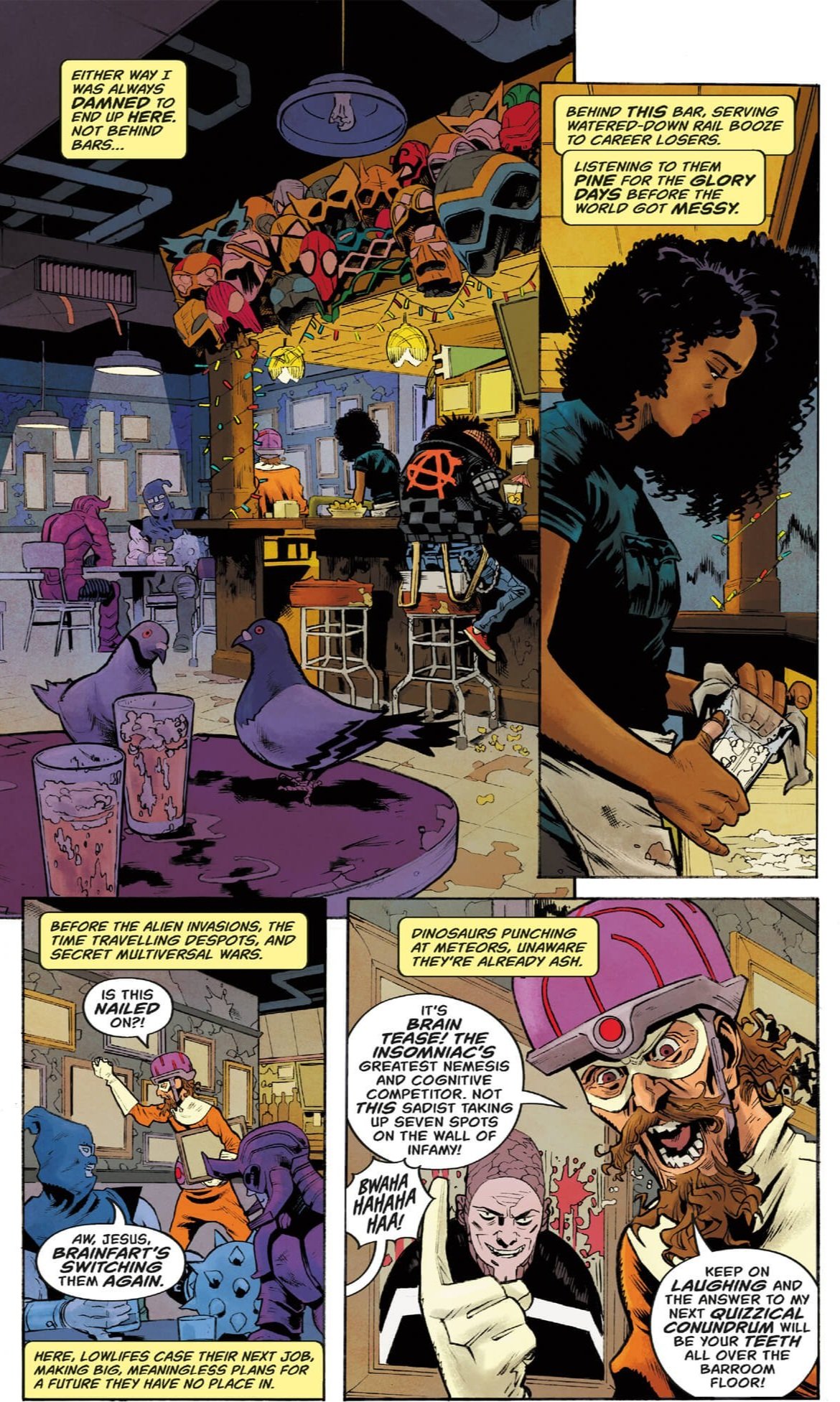Writers: Patton Oswalt, Jordan Blum / Penciller: Scott Hepburn / Colour Artist: Ian Herring / Letterer: Nate Piekos of Blambot / Editors: Daniel Chabon, Misha Gehr, Chuck Howitt-Lease / Collects: Minor Threats #1-#4 / TP / Dark Horse Comics
Please consider subscribing to our Patreon and supporting more original writing on comics. Alternatively, you can make a small one-off donation. Thank you.
Review by Paul Dunne
31st August 2023 (Released: 21st June 2023)
The Pitch: The first creator-owned comic series from Patton Oswalt and Jordan Blum, showrunners of Marvel's M.O.D.O.K on HULU, and superstar artist Scott Hepburn (Tom Morello's Orchid) comes this graphic crime drama about superheroes and villains and the last gasp of the colorful innocent days of the silver and bronze age before they're dragged into the grit-soaked modern era. It’s hard out there for a supervillain. Not the world conquerors, chaos engines, or arch-nemeses...but the little guys, the career criminals. The ones who put on uniforms, knock over jewelry stores, and get tied to telephone poles before the hero swings off to face the actual big bad. Times are tough for costumed crooks, and they’re about to get much worse. The psychotic Stickman has done the unthinkable and murdered Kid Dusk, sidekick to Twilight City’s premier crime-fighter, The Insomniac. The Insomniac’s teammates, The Continuum, are tearing Twilight apart, turning it into a terrifying police state--desperate to capture the Stickman and stop the Insomniac from “crossing that final line” in which he may never come back from. Caught in the middle are the small-time c-list villains, finding it impossible to pull jobs or even walk down the street without being harassed by these heroes. With a bounty on the Stickman’s head, former villain Playtime decides to put together a ragtag team of equally disgruntled supervillains to take down the Stickman and kill him themselves, leading her on a dark journey into the criminal underbelly she’s tried so hard to escape.
You've heard of this book. You know all about it, don't you? You should. It's been a success. But that's a lie, you see. You all might be buying it, but this is a comic that's all about failure. They say a hero is as compelling as their Villains. But what about the supervillains that are... Well, less than super? The characters of Minor Threats are just that. Second raters whom heroes punch between meals. Snack-size antagonists, hanging out at a dive bar tended by one of their own, one whom even amongst their lowly ranks is something of a joke. Like all good comics, we get the introductory issue first and then the origin. When we jump back a little, we're 'treated' to a look inside the life of Folis, an ex-supervillain parolee who can't catch a break. Oswalt and Blum delineate her desperation nicely, showing just how easily one could backslide into a life living below themselves.
A baseline of pain.
What Minor Threats hints at is that, just maybe, the quest for 'normalcy' is the real crime. The book riffs on Astro City, Top Ten, and Black Hammer, but without the idealised, Golden Age, Alex Ross sheen to look up to. It stares instead into the gutter of the Superior Foes Of Spider-Man and Mark Russell's My Bad and then looks further, into the sewer, a place it likes being. It's as if someone slayed those giants and built a comic book universe on top of its corpse, the way the residents of Redport (this universe's Astro City), built housing on the body of a fallen Kaiju that one the heroes killed and couldn't be bothered to dispose of. Squatters on comic book history. What eventually gets to you with Minor Threats isn't the fact that it's seen from the villain's point of view, but how it embraces their lives as every bit as valued and important as DC treats Bruce Wayne's. It says 'dare you to root for these guys', as it dives into backstory, showing you the baseline of pain it took to make them who and what they are. But along with that, there's another notion that percolates: that some criminals enjoy being criminals. It's an idea I've floated in these pages before, largely because that's been my experience, having been around some bad elements in my younger days. But that is not to discount the idea that poverty and environment make people what they are. The thing is here that none of them see, or want, a way out and so embrace the criminality. But can criminality also be a form of heroism if it's a fight against a form of tyranny? The Insomniac, Minor Threats’ Batman, goes off the deep end when his Robin is killed and begins to threaten a form of martial law, surely making him the villain of the piece. heroes and villains mirror each other in other ways in Minor Threats, too. Folis and her crew effectively take the case the way the nominal good guys would, further blurring the lines between them. Similarly, the good guys are very much background players, a force majure that enters to blow the house down every now and then. Our leads hide from them, and avoid them, so too do we.
Surprisingly hard and cynical.
Oswalt and Blum write a surprisingly hard, cynical comic. As Oswalt's M.O.D.O.K. Was undone by bureaucracy, the characters of Minor Threats are hampered by the upright, 'straight' life. Life is cruel and to a certain degree, so is their book. There's humour as you'd expect from these writers... but there's an edge. Thematically this works perfectly as a comment on the shifting tones of comics throughout the decades. There's some inventive paneling by Hepburn that connects separate events fluidly and uses the form to illustrate the function of memory. His pencils are fast, energised. His figures bend like Tradd Moore's – if Tradd Moore's characters had their dreams and ambition severed. This is not an insult. Hepburn creates a filthy, lived-in look for the cast, making them the bad people they knew they could be. Herring adds a true comics palette, with no concession to realism and it works beautifully. It recalls an older period of comics, pre-code and lurid. Piekos taps into the sound of failure, the echo of people who are embarrassed by themselves. His voices tremble with misplaced pride and weakness. Enjoy Minor Threats. Enjoy it as much as its characters enjoy being criminals. Somedays, it's good to be bad.
Minor Threats is available from your local comic shop now. Buy comics here.



